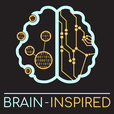
Summary: Check out my short video series about what's missing in AI and Neuroscience. Support the show to get full episodes and join the Discord community. Jeff Schall is the director of the Center for Visual Neurophysiology at York University, where he runs the Schall Lab. His research centers around studying the mechanisms of our decisions, choices, movement control, and attention within the saccadic eye movement brain systems and in mathematical psychology models- in other words, how we decide where and when to look. Jeff was my postdoctoral advisor at Vanderbilt University, and I wanted to revisit a few guiding principles he instills in all his students. Linking Propositions by Davida Teller are a series of logical statements to ensure we rigorously connect the brain activity we record to the psychological functions we want to explain. Strong Inference by John Platt is the scientific method on steroids - a way to make our scientific practice most productive and efficient. We discuss both of these topics in the context of Jeff's eye movement and decision-making science. We also discuss how neurophysiology has changed over the past 30 years, we compare the relatively small models he employs with the huge deep learning models, many of his current projects, and plenty more. If you want to learn more about Jeff's work and approach, I recommend reading in order two of his review papers we discuss as well. One was written 20 years ago (On Building a Bridge Between Brain and Behavior), and the other 2-ish years ago (Accumulators, Neurons, and Response Time). Schall Lab.Twitter: @LabSchall.Related papersLinking Propositions.Strong Inference.On Building a Bridge Between Brain and Behavior.Accumulators, Neurons, and Response Time. 0:00 - Intro 6:51 - Neurophysiology old and new 14:50 - Linking propositions 24:18 - Psychology working with neurophysiology 35:40 - Neuron doctrine, population doctrine 40:28 - Strong Inference and deep learning 46:37 - Model mimicry 51:56 - Scientific fads 57:07 - Current projects 1:06:38 - On leaving academia 1:13:51 - How academia has changed for better and worse
